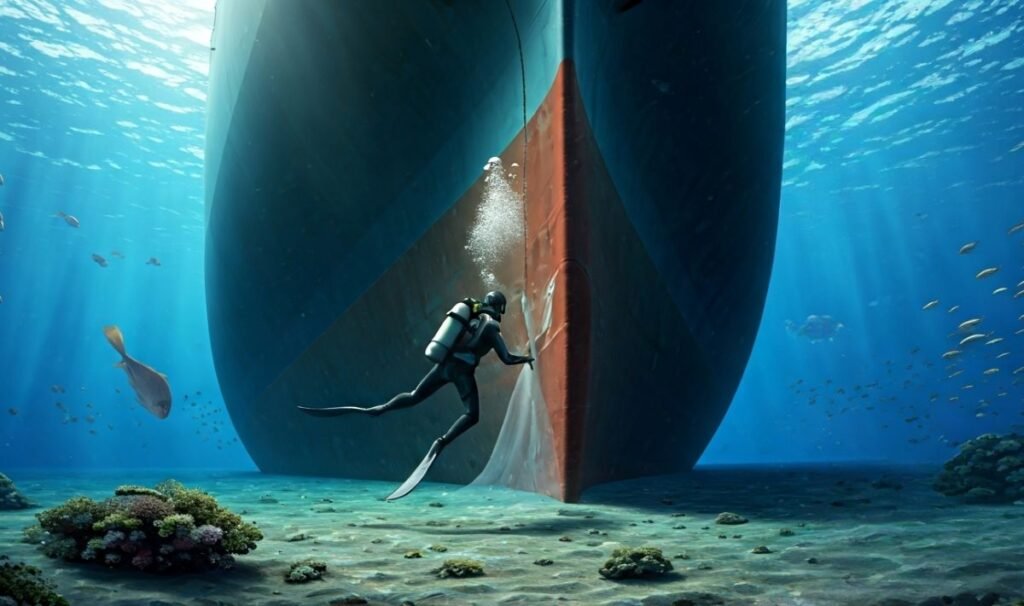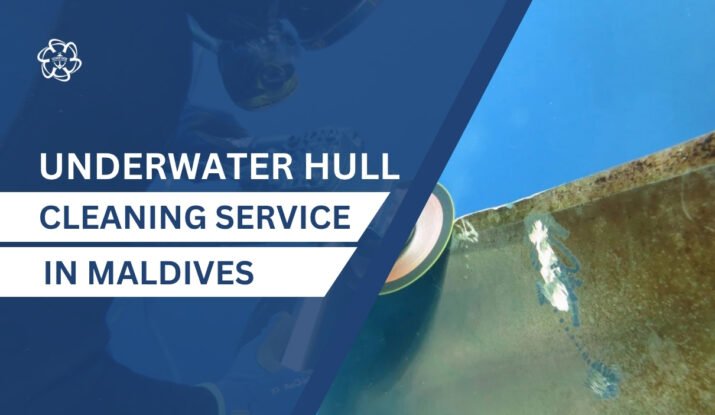Underwater hull cleaning in the Maldives is vital for marine operations. They maintain your vessel’s condition, enhance fuel efficiency, and ensure compliance with environmental regulations. If you’re dealing with hull fouling or aiming for optimal fuel use, these services are essential. Explore why hull cleaning is crucial for both your ship and the environment in this beautiful setting.
Overview of Underwater Hull Cleaning in the Maldives
In the Maldives, hull cleaning services address common issues for ships in warm waters. Utilizing advanced tools like hydraulic brush carts and Hullwiper machines, they efficiently clean flat bottoms, vertical sides, sea chests, and rudders within hours.
These services comply with safety and environmental regulations, with divers and engineers ensuring optimal hull performance. They also provide detailed reports and visual documentation before and after cleaning. Many businesses depend on these reliable services for consistent vessel maintenance.
Importance of Regular Hull Maintenance for Marine Vessels
Hull cleaning is vital for efficient ship operation. Accumulated dirt and marine life increase drag and fuel consumption. Regular cleanings maintain a smooth surface, enhancing fuel efficiency.
Shipowners should prioritize scheduled cleanings to extend vessel lifespan. A dirty hull can lead to costly repairs and affect speed log accuracy, crucial for safe navigation.
Moreover, clean hulls benefit the environment. Dirty hulls consume more fuel and emit pollutants. Regular cleaning reduces fuel use and helps comply with environmental regulations, especially in sensitive areas like the Maldives.
Unique Challenges of Underwater Cleaning in Maldivian Waters
Underwater cleaning in the Maldives is distinct due to warm, tropical waters that promote rapid hull fouling from barnacles and tubeworms. Divers need specialized skills and high-quality equipment for safe removal.
Working at depth poses challenges, so skilled divers often use hydraulic tools and closed-circuit ROVs to reduce risks to themselves and marine life. They strictly follow safety regulations for effective diving practices.
Maldivian laws mandate that cleaning services use environmentally friendly methods that comply with legal standards, ensuring the protection of local marine life while addressing hull fouling issues for ships in the region.
What is Hull Fouling?
Hull fouling occurs when organisms such as algae, barnacles, and tubeworms accumulate on a ship’s underwater hull. This build-up increases drag, slowing the vessel and raising fuel consumption. The problem is particularly severe in warm waters like the Maldives, which promote rapid growth.
Crew members use various methods to combat this issue, including divers and remotely operated vehicles (ROVs). These techniques effectively remove growth and smooth surfaces to delay future fouling. By maintaining a regular cleaning schedule, shipowners can ensure optimal performance. Next, we’ll explore the negative consequences of unmanaged hull fouling.
Negative Impacts of a Fouled Hull
A dirty hull can slow a ship, increase fuel consumption, and raise costs for owners. For companies relying on sea freight, this leads to delayed deliveries and disrupted schedules, harming profits.
Hull fouling also poses safety risks. Buildup creates turbulence that can damage components like sonars and speed logs, complicating navigation and raising accident risks. Regular expert cleaning prevents these issues, ensuring efficient and safe operations.
Benefits of Underwater hull cleaning in the Maldives

Underwater hull cleaning provides significant benefits for marine vessels, primarily enhancing fuel efficiency. Techniques such as hydraulic brush cart cleaning and propeller polishing smooth the hull surface, reducing drag and potentially saving up to 8% in fuel consumption.
These services optimize propeller function, improve overall performance, and reduce costs for shipowners. By maintaining essential equipment, ships operate more efficiently. Investing in underwater hull cleaning boosts performance while controlling expenses. Now, let’s discuss how to determine the best time for your next cleaning.
How Often Should You Clean the Hull?
Hull cleaning schedules vary by ship size, usage, and travel routes. Shipowners typically clean hulls every six to twelve months. Maintaining detailed records helps optimize cleaning intervals.
| Cleaning Interval | Recommendation |
|---|---|
| 6-12 Months | Standard for vessels worldwide |
| Based on Performance | Adjust based on fouling impact |
| After Heavy Growth | When barnacles or tubeworms obstruct surfaces |
Clear records ensure hull cleaning meets the ship’s needs while minimizing marine fouling risks. Effective cleaning and documentation lead to better long-term results.
Environmental and Legal Considerations
Caring for the environment is vital for underwater hull cleaning in the Maldives. Strict regulations ban harmful practices such as open-circuit cleaning in sensitive areas. Professional services use eco-friendly solutions to protect marine life and minimize impact.
These companies comply with local and international regulations, often employing advanced, eco-friendly ROV methods to preserve the planet. Choosing the right provider is essential for safeguarding the Maldivian seas.
Choosing the Right Underwater Hull Cleaning in the Maldives
Selecting the right hull cleaning service requires thorough research. The provider should specialize in underwater services and offer tailored solutions, such as vertical side cleaning and rudder polishing, with flexibility and reliability.
Transparent pricing and accessible communication foster trust. Sharing detailed reports and maintaining consistent rates ensures smooth operations and optimal vessel performance. Now, let’s explore the latest hull cleaning methods.
Advanced Techniques and Equipment Used in Underwater Hull Cleaning in the Maldives
Innovative tools such as ROV-assisted cleaning, hydraulic brush carts, and Hullwiper machines are transforming underwater hull cleaning. They efficiently clean flat-bottom surfaces, sea chests, and rudders with minimal environmental impact.
Diving skills enhance these tools’ effectiveness, ensuring thorough cleaning and vessel efficiency. Today’s underwater services prioritize safety and efficiency, making these methods ideal for the complex demands of marine vessels. Next, we’ll explore eco-friendly practices.
Eco-Friendly Cleaning Solutions and Environmental Compliance
Eco-friendly methods are transforming underwater hull cleaning in the Maldives amid global environmental concerns. Providers now use closed-circuit ROV systems to prevent harmful substances from entering the ocean.
Adhering to regulations is vital, especially in sensitive areas like the Maldives. Service providers focus on eco-conscious techniques that enhance hull performance while safeguarding marine life, reducing carbon emissions, and improving efficiency.
These efforts showcase a commitment to responsible technology adoption, balancing progress with environmental stewardship.
Conclusion
Professional underwater hull cleaning in the Maldives is crucial for your marine vessel. Regular cleaning prevents fouling, reduces fuel consumption, and extends your boat’s lifespan for smoother sailing. Choose a service that uses advanced techniques and eco-friendly products while following environmental regulations. Prioritizing hull cleaning benefits both your vessel and the ecosystem. For advice on underwater hull cleaning in the Maldives, contact us today!
FAQ:
Q1. What are the benefits of professional underwater hull cleaning in the Maldives for boats and yachts?
Professional underwater hull cleaning improves boat performance by reducing drag and polishing propellers, leading to lower fuel consumption. The Maldivian team uses methods tailored to tropical conditions and your boat’s needs.
Q2.How often should I schedule underwater hull cleaning services for my vessel?
Hull cleaning planning depends on vessel usage and fouling levels. Shipowners in the Maldives should clean their hulls every six to twelve months. Proper documentation helps establish an optimal cleaning schedule based on vessel use.
Q3. What techniques and equipment are used in professional underwater hull cleaning?
Professional hull cleaning uses advanced tools such as ROV systems, hydraulic brush carts, and Hullwiper machines. Divers thoroughly clean flat-bottom surfaces, sea chests, rudders, and the hull to optimize vessel performance.
Q4. Are there any environmental regulations regarding underwater hull cleaning in the Maldives?
Maldives regulations require hull cleaning to be safe for marine life. Companies must use closed-circuit methods to minimize harm to the ecosystem, aligning with local and global standards.
Q5. How can I find a reliable service provider for underwater hull cleaning in the Maldives?
Trusted service providers in the Maldives offer transparent pricing, customized solutions, and dependable support, including prompt assistance via email. Choose vendors that provide detailed documentation, use modern equipment, and follow environmental regulations.


